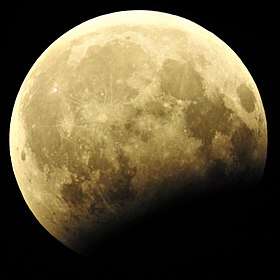May 2087 lunar eclipse
A total lunar eclipse will take place on May 17, 2087. The moon will pass through the center of the Earth's shadow.
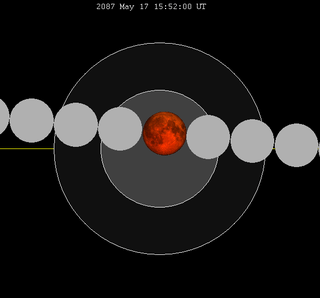
Visibility
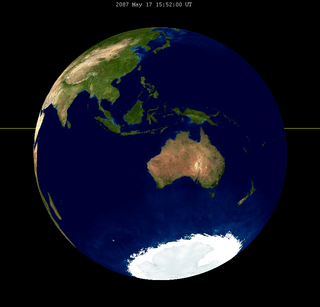
Related lunar eclipses
Saros series
Lunar saros series 132, repeating every 18 years and 11 days, has a total of 71 lunar eclipse events including 44 umbral lunar eclipses (32 partial lunar eclipses and 12 total lunar eclipses).
| Greatest | First | |||
|---|---|---|---|---|
 The greatest eclipse of the series will occur on 2123 Jun 9, lasting 106 minutes.[1] |
Penumbral | Partial | Total | Central |
1492 May 12 |
1636 Aug 16 |
2015 Apr 4 |
2069 May 6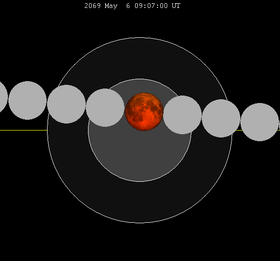 | |
| Last | ||||
| Central | Total | Partial | Penumbral | |
2177 Jul 11 |
2213 Aug 2 |
2429 Dec 11 |
2754 Jun 26 | |
There are 11 series events between 1901 and 2100, grouped into threes (called an exeligmos), each column with approximately the same viewing longitude on earth.
| 1907 Jan 29 | 1925 Feb 8 | 1943 Feb 20 | |||
 |
 |
 |
 |
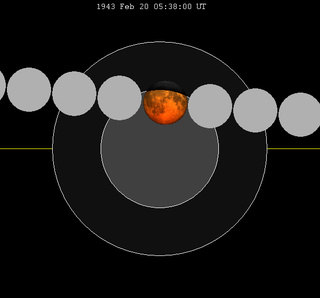 |
 |
| 1961 Mar 2 | 1979 Mar 13 | 1997 Mar 24 | |||
 |
 |
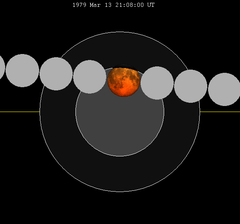 |
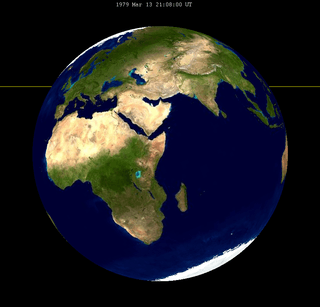 |
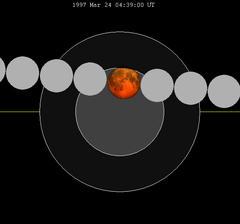 |
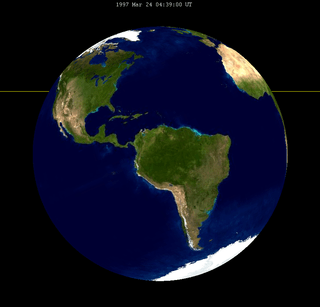 |
| 2015 Apr 4 | 2033 Apr 14 | 2051 Apr 26 | |||
 |
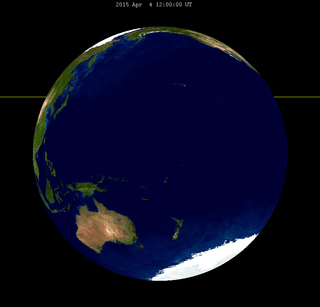 |
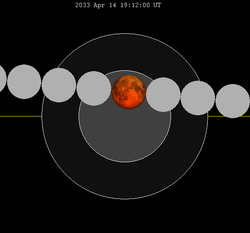 |
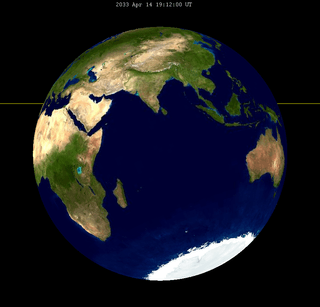 |
 |
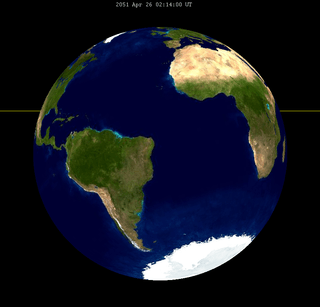 |
| 2069 May 6 | 2087 May 17 | ||||
 |
 |
 |
 | ||
Inex series
The inex series repeats eclipses 20 days short of 29 years, repeating on average every 10571.95 days. This period is equal to 358 lunations (synodic months) and 388.5 draconic months. Saros series increment by one on successive Inex events and repeat at alternate ascending and descending lunar nodes.
This period is 383.6734 anomalistic months (the period of the Moon's elliptical orbital precession). Despite the average 0.05 time-of-day shift between subsequent events, the variation of the Moon in its elliptical orbit at each event causes the actual eclipse time to vary significantly. It is a part of Lunar Inex series 40.
All events in this series shown (from 1000 to 2500 and beyond) are central total lunar eclipses.
| Descending node | Ascending node | Descending node | Ascending node | ||||
|---|---|---|---|---|---|---|---|
| Saros | Date | Saros | Date | Saros | Date | Saros | Date |
| 95 | 1016 May 24 | 96 | 1045 May 3 | 97 | 1074 Apr 14 | 98 | 1103 Mar 25 |
| 99 | 1132 Mar 3 | 100 | 1161 Feb 12 | 101 | 1190 Jan 23 | 102 | 1219 Jan 2 |
| 103 | 1247 Dec 13 | 104 | 1276 Nov 23 | 105 | 1305 Nov 2 | 106 | 1334 Oct 13 |
| 107 | 1363 Sep 23 | 108 | 1392 Sep 2 | 109 | 1421 Aug 13 | 110 | 1450 Jul 24 |
| 111 | 1479 Jul 4 | 112 | 1508 Jun 13 |
113 | 1537 May 24 | 114 | 1566 May 4 |
| 115 | 1595 Apr 24 | 116 | 1624 Apr 3 | 117 | 1653 Mar 14 | 118 | 1682 Feb 21 |
| 119 | 1711 Feb 3 | 120 | 1740 Jan 13 | 121 | 1768 Dec 23 | 122 | 1797 Dec 4 |
| 123 | 1826 Nov 14 | 124 | 1855 Oct 25 | 125 | 1884 Oct 4 | 126 | 1913 Sep 15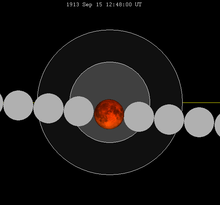 |
| 127 | 1942 Aug 26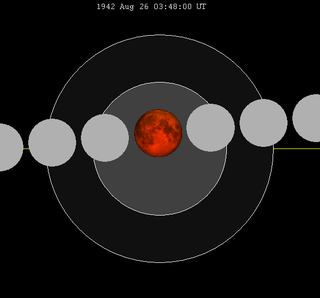 |
128 | 1971 Aug 6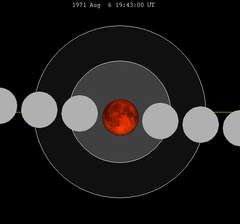 |
129 | 2000 Jul 16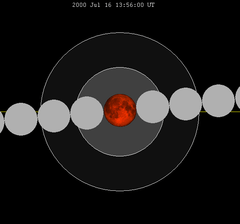 |
130 | 2029 Jun 26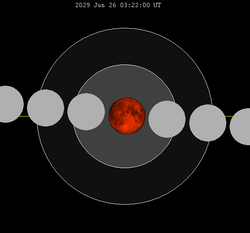 |
| 131 | 2058 Jun 6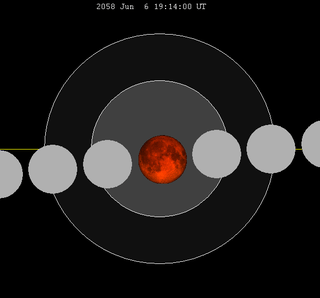 |
132 | 2087 May 17 |
133 | 2116 Apr 27 | 134 | 2145 Apr 7 |
| 135 | 2174 Mar 18 | 136 | 2203 Feb 26 | 137 | 2232 Feb 7 | 138 | 2261 Jan 17 |
| 139 | 2289 Dec 27 | 140 | 2318 Dec 9 | 141 | 2347 Nov 19 | 142 | 2376 Oct 28 |
| 143 | 2405 Oct 8 | 144 | 2434 Sep 18 | 145 | 2463 Aug 29 | 146 | 2492 Aug 8 |
Half-Saros cycle
A lunar eclipse will be preceded and followed by solar eclipses by 9 years and 5.5 days (a half saros).[2] This lunar eclipse is related to two total solar eclipses of Solar Saros 139.
| May 11, 2078 | May 22, 2096 |
|---|---|
 |
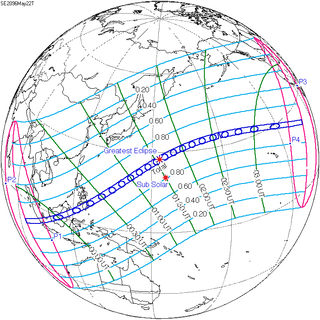 |
See also
- List of lunar eclipses and List of 21st-century lunar eclipses
Notes
- Listing of Eclipses of series 132
- Mathematical Astronomy Morsels, Jean Meeus, p.110, Chapter 18, The half-saros
